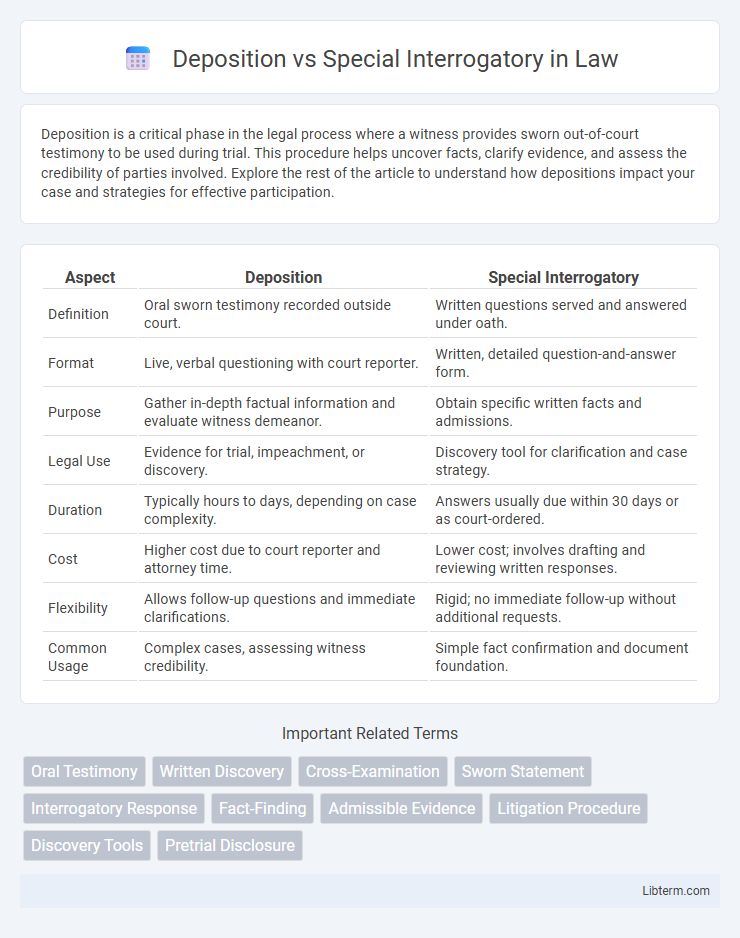Deposition is a critical phase in the legal process where a witness provides sworn out-of-court testimony to be used during trial. This procedure helps uncover facts, clarify evidence, and assess the credibility of parties involved. Explore the rest of the article to understand how depositions impact your case and strategies for effective participation.
Table of Comparison
| Aspect | Deposition | Special Interrogatory |
|---|---|---|
| Definition | Oral sworn testimony recorded outside court. | Written questions served and answered under oath. |
| Format | Live, verbal questioning with court reporter. | Written, detailed question-and-answer form. |
| Purpose | Gather in-depth factual information and evaluate witness demeanor. | Obtain specific written facts and admissions. |
| Legal Use | Evidence for trial, impeachment, or discovery. | Discovery tool for clarification and case strategy. |
| Duration | Typically hours to days, depending on case complexity. | Answers usually due within 30 days or as court-ordered. |
| Cost | Higher cost due to court reporter and attorney time. | Lower cost; involves drafting and reviewing written responses. |
| Flexibility | Allows follow-up questions and immediate clarifications. | Rigid; no immediate follow-up without additional requests. |
| Common Usage | Complex cases, assessing witness credibility. | Simple fact confirmation and document foundation. |
Understanding Depositions: Definition and Purpose
Depositions involve sworn, out-of-court testimony given by a witness or party involved in a legal case, recorded for later use in trial or discovery. The primary purpose of a deposition is to gather detailed information, clarify facts, and assess the credibility and knowledge of witnesses under oath. Unlike special interrogatories, depositions provide an opportunity for attorneys to ask follow-up questions and observe verbal and non-verbal responses in real time.
What are Special Interrogatories?
Special Interrogatories are written questions served by one party in a lawsuit to the opposing party, requiring detailed written answers under oath within a specified timeframe. They are designed to obtain specific factual information and narrow down issues before trial, often complementing oral depositions. These interrogatories enable attorneys to clarify facts, identify witnesses, and gather evidence efficiently during the pre-trial discovery process.
Key Differences Between Depositions and Special Interrogatories
Depositions involve oral questioning under oath, allowing attorneys to observe witness demeanor and obtain real-time responses, while special interrogatories consist of written questions requiring detailed, signed written answers. Depositions provide opportunities for follow-up questions and immediate clarification, whereas special interrogatories are limited to the scope of the submitted written questions without oral interaction. The cost and time investment for depositions are typically higher due to their formal setting and transcription requirements; special interrogatories are more cost-effective and efficient for obtaining straightforward factual information.
Advantages of Using Depositions in Legal Proceedings
Depositions provide the advantage of capturing real-time verbal testimony under oath, allowing attorneys to observe non-verbal cues and assess witness credibility more effectively than written Special Interrogatories. They enable immediate follow-up questions, fostering dynamic clarification and deeper exploration of facts during legal proceedings. Unlike Special Interrogatories, which are limited to written responses, depositions create a comprehensive and flexible evidentiary record crucial for trial preparation and case strategy.
Benefits of Special Interrogatories in Discovery
Special Interrogatories provide a cost-effective and efficient method for obtaining detailed, written answers from the opposing party during discovery. They allow precise targeting of specific factual issues, promoting clarity and reducing ambiguity compared to oral depositions. Courts favor Special Interrogatories for their ability to streamline the discovery process and minimize expenses related to scheduling and attorney time.
When to Choose a Deposition Over a Special Interrogatory
Choosing a deposition over a special interrogatory is ideal when detailed, spontaneous testimony is required to assess a witness's credibility or uncover nuances that written responses cannot capture. Depositions allow real-time follow-up questions and observation of witness demeanor, which are critical in complex cases involving conflicting facts or intricate legal issues. Special interrogatories, by contrast, suit straightforward fact-finding where precise, written answers suffice without the necessity for immediate clarification.
Legal Strategies: Combining Depositions and Special Interrogatories
Combining depositions and special interrogatories enhances legal strategies by leveraging detailed oral testimonies alongside written, targeted inquiries to build a comprehensive fact pattern. Depositions provide dynamic, real-time reactions and the opportunity for follow-up questions, while special interrogatories allow precise, documented answers that can narrow the scope of issues before trial. Strategic use of both tools ensures efficient evidence gathering, reduces surprises, and strengthens case preparation during pre-trial discovery.
Preparing for a Deposition: Essential Tips
Preparing for a deposition requires thorough review of case documents, understanding the key facts, and anticipating opposing counsel's questions to provide clear, concise answers. Effective preparation includes practicing responses with legal counsel, organizing exhibits for easy reference, and managing demeanor to maintain professionalism under pressure. Mastering these essential steps minimizes surprises and strengthens testimony credibility during the deposition process.
Drafting Effective Special Interrogatories
Drafting effective special interrogatories requires precise, clear, and narrowly tailored questions to elicit specific information, minimizing ambiguity and objections. Unlike depositions, which allow for dynamic oral testimony, special interrogatories must capture detailed facts in a written format, emphasizing clear legal definitions and relevant case references. Utilizing focused language enhances the likelihood of obtaining complete and accurate responses critical for building a strong case record.
Common Mistakes to Avoid in Depositions and Special Interrogatories
Common mistakes to avoid in depositions include failing to prepare adequately, allowing witnesses to provide vague or evasive answers, and not objecting to improper questions promptly. In special interrogatories, avoid submitting overly broad or ambiguous questions that can lead to incomplete or unhelpful responses. Ensuring clarity, relevance, and adherence to procedural rules in both depositions and special interrogatories improves the quality of discovery and strengthens case strategy.
Deposition Infographic

 libterm.com
libterm.com